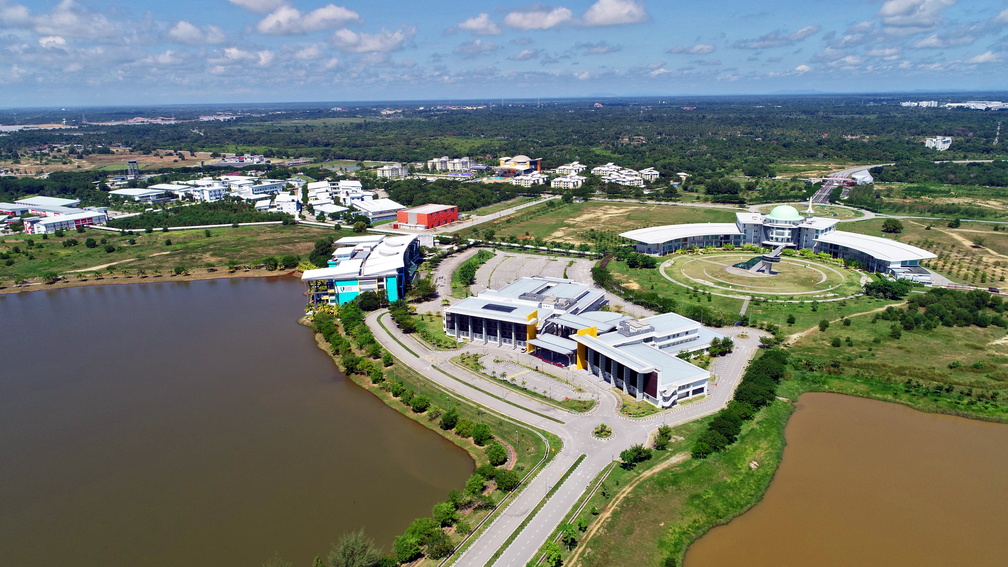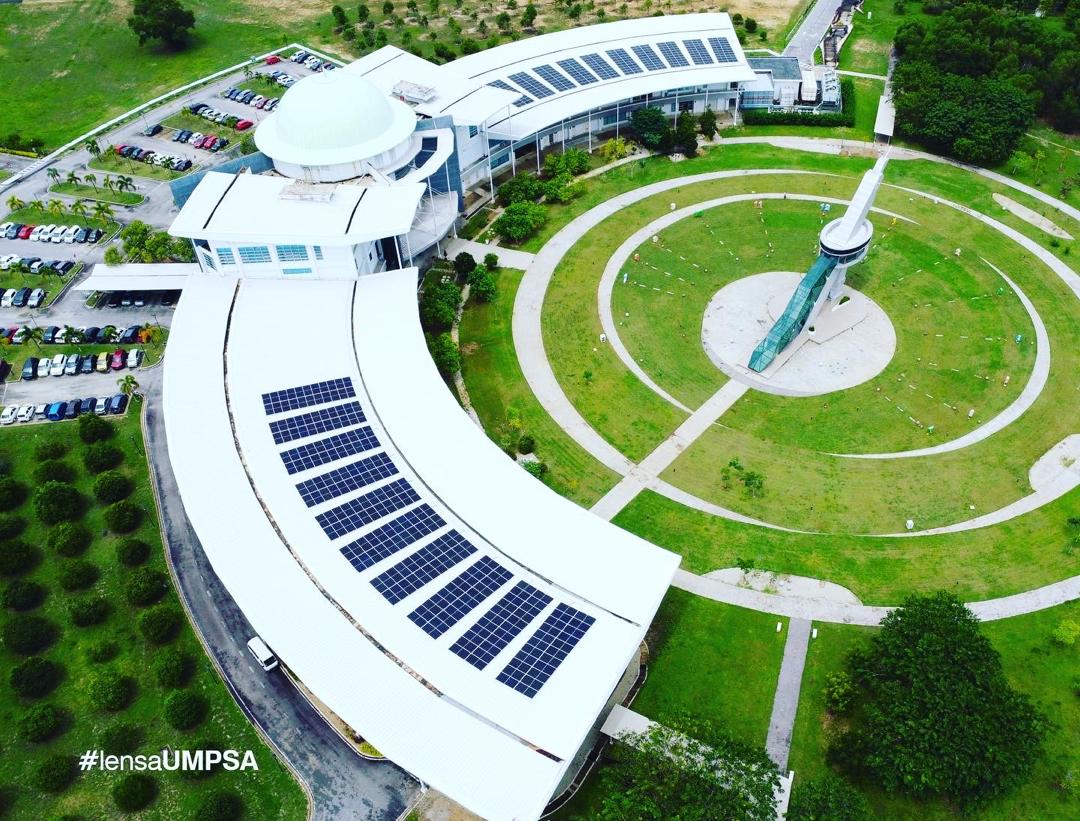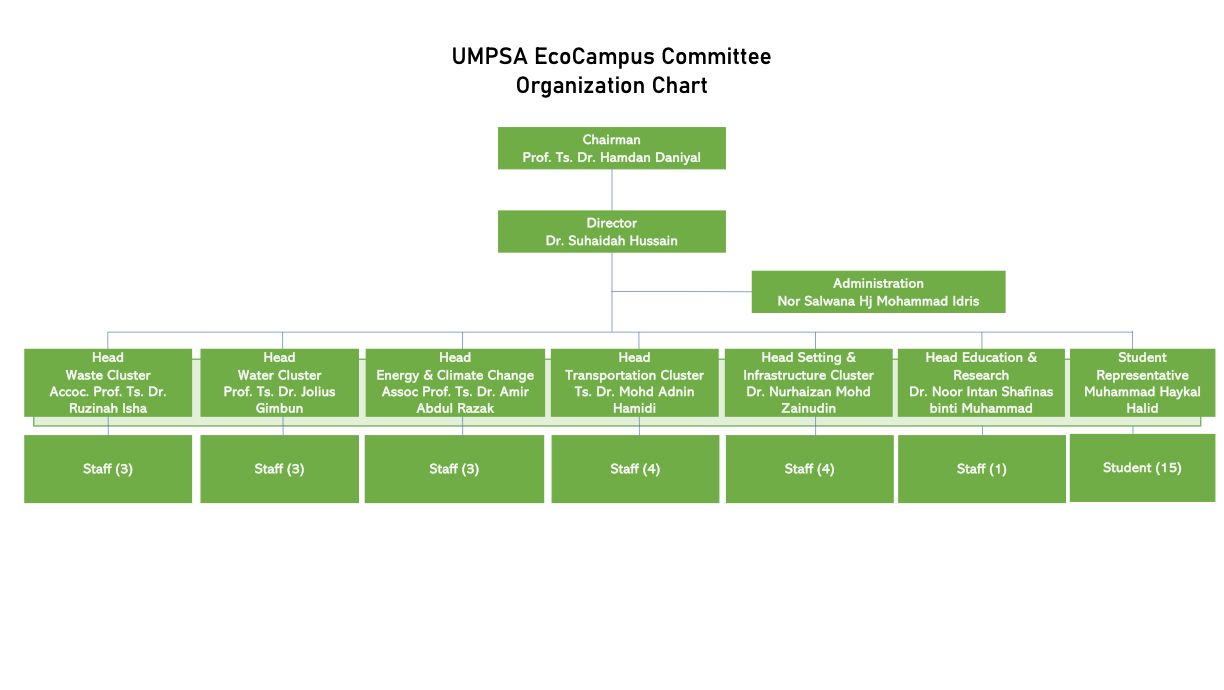UMPSA EcoCampus
About Us
Our sustainability journey encompasses cutting-edge green technologies, renewable energy initiatives, and community-driven environmental programmes
Universiti Malaysia Pahang Al-Sultan Abdullah (UMPSA) stands at the forefront of sustainable education, pioneering an innovative eco campus transformation that harmonises academic excellence with environmental stewardship. Our comprehensive sustainability journey encompasses cutting-edge green technologies, renewable energy initiatives, and community-driven environmental programmes that position UMPSA as Malaysia's leading sustainable university.
Through strategic partnerships, innovative research, and commitment towards environmental responsibility, UMPSA are creating initiatives where students, faculty, and the broader community can experience and contribute to sustainable practices that will define the future of higher education.
UMPSA EcoCharter
Universiti Malaysia Pahang Al-Sultan Abdullah (UMPSA) is committed to advancing sustainability in education, research, campus operations, and community engagement. Guided by Environmental, Social, and Governance (ESG) principles and aligned with the UN Sustainable Development Goals (SDGs), this EcoCharter is UMPSA’s pledge to build a resilient and sustainable future for students, staff, and society.

Environmental Stewardship
Reducing UMPSA’s carbon footprint through renewable energy projects such as the Solar Rooftop and Solar PV Wakaf Huts.
Strengthen recycling, composting, and zero-waste campus initiatives.
Protect biodiversity with eco-landscaping, tree planting, and green space conservation.
Apply Life Cycle Assessment (LCA) and sustainable practices in teaching, research, and campus operations.
Social Responsibility
Provide an inclusive, equitable, and safe environment for all.
Encourage student participation through groups such as EcoSiswA, Enactus, and the Eco-Campus Student Committee.
Work with local communities on projects like eco-mudball river rehabilitation and sustainable mushroom farming.
Embed sustainability in the curriculum and co-curriculum, preparing students as leaders in green technology and responsible citizenship.
Governance and Transparency
Uphold accountability, integrity, and transparency in governance.
Align reporting with UI GreenMetric, SDGs, and Malaysia’s National Energy Transition Roadmap (NETR).
Integrate sustainability into strategic planning, research, and financial decisions.
Maintain open dialogue with students, staff, alumni, government, and industry partners.
Implementation and Accountability
Track progress with KPIs (e.g., renewable energy use, GHG reduction, waste diversion).
Publish an annual Sustainability Report on achievements and challenges.
Reward sustainable practices among students, staff, and research teams.
Review and improve the EcoCharter regularly in line with national and global frameworks.
EcoCampus Policy
UMPSA's EcoCampus Journey
Our Journey to Sustainability
Born from a strategic blueprint in 2022, the UMPSA EcoCampus initiative began its journey toward creating a greener, more sustainable university. Our commitment goes beyond simple eco-friendly practices; it's a comprehensive, top-down, and bottom-up approach to integrate sustainability into every aspect of campus life.
Our efforts are channeled through six dedicated clusters, each focusing on a critical area of environmental management. This collaborative framework allows us to address a wide range of challenges and opportunities.
- Waste Cluster: Focused on reducing our ecological footprint through effective waste management, recycling programs, and innovative composting solutions.
- Water Cluster: Dedicated to water conservation and the efficient management of our campus water resources.
- Energy & Climate Change Cluster: Working to minimize our carbon footprint by promoting energy efficiency and exploring renewable energy sources.
- Transportation Cluster: Encouraging sustainable mobility on campus by developing green transportation options and infrastructure.
- Setting & Infrastructure Cluster: Ensuring that our buildings and grounds are designed and maintained with sustainability at the core.
- Education & Research Cluster: Integrating eco-friendly principles into our curriculum and fostering cutting-edge research to solve real-world environmental challenges.
Together, these clusters form the backbone of our mission to not only build a sustainable campus but also to inspire a new generation of leaders committed to a greener future.

Our Global Recognition and Future Vision
Our commitment to sustainability has been recognized on a global scale. We are proud that our efforts have been acknowledged by prestigious international rankings, including the UI GreenMetric World University Rankings, The Impact Rankings, and the QS Sustainability Rankings. This recognition validates the hard work of our entire community and serves as a powerful motivator to continue our journey.
Moving forward, our goal is to strengthen our initiatives and become a leader in sustainability throughout Southeast Asia. We believe that by enhancing our programs and fostering innovation, we can set a new standard for eco-friendly campus management in the region.
Achieving this vision depends on the active participation of every member of our community, especially our students. We are committed to empowering our students to be at the forefront of this movement, engaging them in every initiative to build a better, greener campus for the future.
EcoCampus Committee

Energy & Climate Change Cluster
Associate Professor Ts. Dr. Amir Bin Abdul Razak (Head)
Ts. Mohd Nurulakla Bin Mohd Azlan - Engineer, Centre for Development & Asset Management
Dr. Ahmad Fadzil Bin Sharol - Senior Lecturer, Faculty of Mechanical & Automotive Engineering Technology
Ts. Dr. Nurizatul Atikha Binti Rahmat - Senior Lecturer, Faculty of Mechanical & Automotive Engineering Technology
Transportation Cluster
Ts. Dr. Mohd Adnin Bin Hamidi (Head)
Mr. Kamal Hafizal Bin Kamaruddin - Senior Engineer, Centre for Development & Asset Management
Mr. Mohd Raizalhlimy Bin Mohd Rais - Manager, Student & Alumni Affairs Department
Ts. Muhammad Imran Bin Mohamad Sairaji - Vocational Training Officer, Advanced TVET Centre
Mr. Ahmad Fauzi Bin Ahmad Bakti - Director, Security Centre
Setting & Infrastructure Cluster
Dr. Nurhaizan Mohd Zainuddin (Head)
Ts. Dr. Muhammad Syamsul Imran Bin Zainol - Senior Lecturer, Faculty of Civil Engineering Technology
Ms. Norazlinda Binti Nor Akbar - Architect, Centre for Development & Asset Management
Mr. Mohammad Syukri Bin Mansin - Assistant Architectural Officer, Centre for Development & Asset Management
Dr. Liyana Binti Mohamed Yusof - Senior Lecturer, Faculty of Civil Engineering Technology
Water Cluster
Professor Ts. Dr. Jolius Bin Gimbun (Head)
Professor Ir. Dr. Mohd Fairusham Bin Ghazali - Director, Centre for Fluid & Advanced Process Research
Mr. Abdul Walik Bin Yusuf - Engineer, Centre for Development & Asset Management
Ts. Joharizal Bin Johari - Vocational Training Officer, Advanced TVET Centre
Waste Cluster
Associate Professor Ts. Dr. Ruzinah Binti Isha (Head)
Ir. Ts. Aldeelnorfarhanne Bin Mohamad - Engineer, Centre for Development & Asset Management
Mr. Alauwi Bin Mohd Sikah - Assistant Engineer, Centre for Development & Asset Management
Ms. Siti Sofiasuhana Binti Fouzi - Assistant Science Officer, Occupational Safety & Health Management Division
Education & Research Cluster
Dr. Noor Intan Shafinas Binti Muhammad (Head)
Dr. Nor Rokiah Hanum Binti Md Haron - Senior Lecturer, Faculty of Industrial Management
Student Committee
1.Muhammad Haykal Halid (Student Council)
2.Tharshen A/L Nagendran (RE25028)
3.Arysha Rania Bt Shahrul Nizam (RE25082)
4.Diryutesh Karan A/L Karunakaran (HA24001)
5.Jiithendhran a/l Sashidhran (MA24011)
6.Aziff Syahin Rifdi bin Roslee (MA24055)
7.Ahmad Haziq Safwan Bin Ahmad Syahril (MA24006)
8.Hayati Kiram (PKZ25033)
9.Raji Luqman (PTV22001)
10.Nurlyana Hazwani Binti Nong Chek (TE230710)
11.Muhammad Muzaffarirfan Bin Mohd Hairul Anuar (TG22109)
12.Muhammad Hariez Mirza Bin Mohd Azhar (RS24263)
13.Muhammad Fazleizam Bin Mohd Khairudin (PB23172)
14.Zahin Zikri Bin Zawawi (SD23019)

